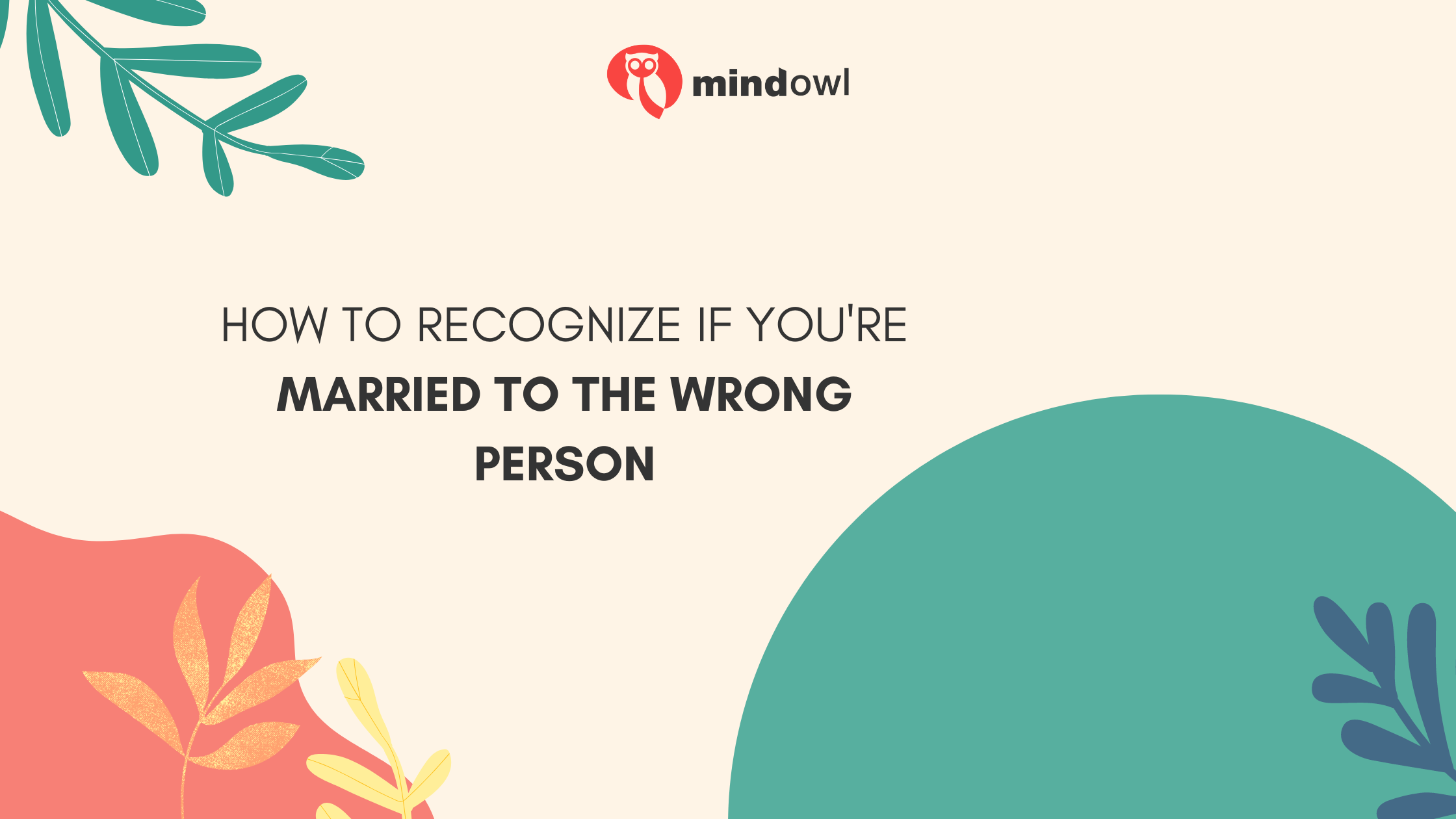
Discovering that you might be hitched to the wrong mate can turn daily joy into a constant struggle. Surprisingly, research suggests many realise they’ve wed poorly only years down the line.
Our post sheds light on recognising these telltale signs and navigating towards clarity in your partnership. Read on – it could change your life.
Key Takeaways
- If you fight a lot and don’t share small things, it may mean your marriage has problems.
- Feeling like you’re better than your partner can hurt your marriage.
- Talking to someone who knows about relationships can help if things are tough.
- Remember to be patient and kind; these help make marriages strong.
- Fixing problems in a marriage is good, not bad.
Signs That You May Have Married the Wrong Person

Constant bickering, lack of quality time together, and fantasising about being with someone else are all signs that you may have married the wrong person. These red flags can indicate underlying issues in the relationship that need to be addressed.
Constant bickering
Fighting over small things all the time can be a big sign that your marriage isn’t going well. If you and your partner argue a lot, it might mean something’s not right. This kind of constant arguing can make both people feel stressed and unhappy.
Picking fights over tiny matters may show deeper issues in the relationship. These endless arguments don’t just ruin the peace; they chip away at the feelings that hold you and your spouse together.
It is important to think about this if it happens a lot in your married life.
Lack of sharing the “little things”
It’s important to notice how much you and your spouse share about day-to-day life. Even small moments matter in marriage. You might find that not talking about the new song you love or a funny thing you saw on the way to work means more than it seems. This silence can leave a gap between you and your partner.
Sharing little joys and troubles is part of being close to someone. For example, you may have thought getting matching tungsten rings would symbolize your eternal love, but your partner didn’t share that sentiment. Over time, small things makes your bond strong. But if neither of you talks about these things, it could be a sign that something isn’t right.
Fantasising about being with someone else
Thinking about being with another person can be a big red flag in your marriage. It often means you’re not feeling connected to your partner. If your daydreams about someone else happen a lot, this might tell you that something’s missing at home.
You could be craving more love or excitement than what you’re getting now.
These dreams of being with somebody else show you may need to think hard about your relationship. They hint that you’re not fully happy or content with the one you married. Talking openly and honestly with each other is key here.
Find out why these thoughts are happening and if there’s a way to fix things together.
Escalating fights
Dreaming about a different life partner might lead to more severe arguments. If you find that small disagreements turn into big fights, this is a sign of trouble. Married couples should be able to talk things through.
But when every chat becomes a battle, it means there’s a deep problem.
Fights that get worse every time show that anger and hurt are growing. These fights can make both people feel sad or angry for a long time. When daily spats become the norm, think hard about what’s going wrong in your marriage.
It could mean you and your spouse need help to fix things before they break for good.
Lack of quality time together
Escalating fights often come from not feeling close or understood by your partner. If you and your spouse don’t spend quality time together, it can be a big warning sign. You might find that you’re always busy, or when you are both home, you do things apart instead of together.
Fun times and deep talks seem rare.
True closeness means sharing your thoughts and feelings with one another regularly. If being alone with your husband or wife feels strange or uncomfortable, ask yourself why that is.
It’s important to cherish moments with the person you married—whether it’s eating dinner together, watching a movie, or just talking about how your day went. This helps keep the love alive in a marriage.
Seeking distractions
You might be trying to escape from reality if you keep looking for things to do instead of spending time with your partner. This often means diving into hobbies, TV shows or even a long commute just to avoid being home.
It’s like you’re reaching for anything that can fill the silence and space between you two.
Feeling happier when doing these things alone, rather than sharing them with your spouse, is a big sign something isn’t right in your marriage. Now let’s look at how patience and irritability play their parts.
Impatience and irritability
Turning away from distractions, it’s important to note the role impatience and irritability play in a marriage. These feelings might point to deeper problems between you and your spouse.
If small things they do make you quickly upset or angry, this isn’t a good sign. It shows there may be issues that neither of you are talking about.
Feeling impatient often means not wanting to wait for someone else. In a marriage, this can happen if one person feels like the other is holding them back or not listening. Irritability also creeps in when hurtful words sting more than they should, leading to anger and fights that don’t get solved easily.
This can harm the love and respect you both need for a happy life together.
Feeling like business partners
As impatience and irritability start to dominate the relationship, couples may find themselves feeling more like business partners than intimate companions. The connection that once thrived with affection and emotional closeness can shift into a practical partnership focused on managing daily responsibilities, rather than nurturing the bond between spouses.
This can lead to a sense of detachment and a lack of emotional fulfilment within the marriage, making it crucial to recognise and address this shift before it further erodes the relationship.
If left unaddressed, this transition towards feeling like business partners can signify an alarming emotional distance in the marriage. It’s essential for couples to acknowledge this change as a potential warning sign that their relationship may be in need of rekindling intimacy and prioritising emotional connection over logistical cooperation.
How to Re-evaluate Your Marriage

Re-evaluating your marriage starts with letting go of unrealistic expectations and accepting imperfections. Open communication and asking the right questions can also help you gain clarity and insight into the state of your relationship.
Let go of unrealistic expectations
Marriages can suffer when unrealistic hopes and desires cloud the reality of relationships. It’s important to let go of these unrealistic expectations to strengthen your marriage. Almost half of divorces are linked to expecting too much from a partner.
Recalibrating your expectations is vital for a healthy marriage, as it helps differentiate between what’s realistic and what’s not.
Understanding this can help you stay committed and work on building a stronger connection with your spouse. By accepting imperfections, communicating openly, and asking the right questions, you pave the way for a more fulfilling relationship based on realistic expectations.
Accept imperfections
To build a fulfilling marriage, it’s essential to let go of unrealistic expectations and accept imperfections. Embracing your spouse’s flaws and recognising that nobody is perfect can lead to a stronger and more meaningful relationship.
Acknowledging imperfections allows you to focus on the positive aspects of your partner, fostering love, understanding, and empathy in the marriage. By accepting imperfections, you create space for growth and connection with your spouse while building a foundation for a fulfilling and lasting partnership.
Recognising that both partners have flaws fosters understanding and compassion in the relationship. Remembering this encourages mutual support rather than judgement or criticism towards each other.
Communicate openly
When it comes to re-evaluating your marriage, communication is key. Open and honest conversations with your partner can help in recognising and addressing underlying issues. It’s important to create a safe space for both partners to express their thoughts and feelings without the fear of judgement or interruption.
By actively listening to each other, you can gain a better understanding of your spouse’s perspective and work together towards finding solutions.
Communication is not just about talking but also about truly listening to what your partner has to say. It involves expressing your own needs while being empathetic towards your partner’s concerns.
Ask the right questions
When evaluating your marriage, it’s essential to ask the right questions. Consider asking your partner about their expectations of a fulfilling marriage and what simple living means to them.
Reflect on whether you both share common values and long-term goals. Asking clear questions can help clarify if you are married to the wrong person or not.
In addition, consider discussing with your spouse about how they perceive fidelity in a relationship and what they believe makes a good parent. Evaluating your marriage through these questions will provide insights into whether you are both aligned in important aspects of life and lay the groundwork for re-evaluating your relationship.
Why Contempt Is a Red Flag
Contempt, characterised by disrespect and disdain towards your partner, can erode the foundation of a marriage, leading to long-term damage. To learn more about how contempt can negatively impact your relationship and how to address it, continue reading.
Definition of contempt
Contempt in a marriage is when you feel like you are better than your partner. It’s more than just being critical; it’s about feeling superior to them. You may mock, dismiss, or belittle your spouse’s feelings and thoughts, thinking they’re ridiculous.
This belief that your partner is inferior damages the relationship. It creates a toxic dynamic where one person feels demeaned and disrespected. Over time, contempt can erode the foundation of love and trust in a marriage.
How it can damage a marriage
Contempt, which is the feeling that someone or something is beneath consideration and worthless, can cause serious harm to a marriage. It often leads to shaming about sexuality and a lack of empathy from one’s partner.
This contemptuous behaviour can create feelings of resentment and detachment within the relationship, leading to irreparable damage over time. Research shows that contempt is the number one predictor of divorce within the first six years of marriage due to its detrimental impact on communication and connection between partners.
When contempt takes hold in a marriage, it can lead to a lack of understanding for each other’s perspectives and create an atmosphere filled with disdain after arguments. This toxic dynamic erodes trust and emotional intimacy between spouses, making it increasingly challenging to repair the damage inflicted on the relationship over time.
Practising gratitude and appreciation
Practising gratitude and appreciation in a marriage is crucial for nurturing a healthy relationship. It can help to foster empathy, kindness, and humility towards your spouse, creating an environment of mutual respect.
By expressing genuine appreciation for the little things your partner does, you can reinforce feelings of fondness and admiration, strengthening the emotional connection between you both.
Research has shown that couples who regularly express gratitude towards each other tend to experience higher levels of satisfaction in their marriage.
Acknowledging and appreciating your partner’s efforts can also lead to a deeper understanding of each other’s perspectives and experiences. This can create a positive cycle where both partners feel valued and understood, contributing to overall marital happiness.
Dealing with Growing Apart
Acknowledge and address any issues that have caused you to drift apart in your marriage. Reconnect through shared experiences and seek professional help if needed to work through any challenges you may be facing.
Acknowledge and address issues
It’s essential to acknowledge and address any issues in a marriage before they grow into bigger problems. When you notice constant bickering, lack of sharing the “little things,” or escalating fights, it’s time to take action.
Avoiding difficult conversations and not spending quality time together are also signs of growing apart that need attention. Remember that resentment often comes from an inability to discuss past hurts without stirring up more anger.
It’s crucial to communicate openly and seek professional help if needed.
Reconnect through shared experiences
To reconnect with your partner, create opportunities for shared experiences. Sharing activities like cooking together, going for a walk, or trying a new hobby can strengthen your bond.
These moments of togetherness help in rebuilding emotional connection and understanding each other better. Prioritising these shared experiences can play a crucial role in rekindling the intimacy and closeness that may have dwindled over time.
Remember that small gestures matter, such as reminiscing about past enjoyable times or planning future adventures together. Engaging in these shared experiences can reignite the spark and bring back feelings of joy and connectedness within your marriage while creating lasting memories to cherish.
Seek professional help
If you’re finding it hard to reconnect with your spouse despite your efforts, talking to a mental health professional or seeking couples counselling can offer valuable support and guidance.
These professionals can help address the distance and growing apart in a marriage, providing strategies and insights tailored to your specific situation. It’s important to recognise that reaching out for professional help is a positive step towards re-evaluating and strengthening your marriage, offering you both the opportunity to work through challenges in a supportive environment.
Remember that seeking professional assistance doesn’t mean admitting failure; rather, it demonstrates courage and commitment to finding solutions that can benefit both you and your partner.
The Power of Patience and Kindness
Cultivating patience and kindness in your marriage can strengthen the relationship, leading to greater understanding and empathy between partners. By practicing these qualities, you can create a more harmonious and fulfilling connection with your spouse.
How these qualities strengthen a relationship
Patience is a vital ingredient in a thriving relationship. It allows for understanding and acceptance, fostering an environment where both partners feel valued and heard. Additionally, effective communication plays a crucial role in strengthening a relationship.
Open, honest discussions build trust and respect, laying the foundation for a strong and lasting connection between spouses.
Kindness is another essential quality that strengthens relationships. Small acts of kindness can go a long way in making your partner feel appreciated and loved. Furthermore, empathy and commitment contribute to creating a safe and supportive space within the relationship, allowing both partners to navigate challenges together with understanding and determination.
Practical ways to cultivate them
Conclusion
In conclusion, recognising if you’re married to the wrong person involves being honest with yourself. Communicate openly and address issues as they arise. Accept imperfections and strive to cultivate patience and kindness in your relationship.
Remember, seeking professional help is a sign of strength, not weakness. Lastly, don’t be afraid to re-evaluate your marriage and make necessary changes for your well-being.
FAQs
1. How can I tell if I married the wrong person?
You might think you married the wrong person if you feel trapped, have nothing in common, or your life with your spouse doesn’t make you happy.
2. Is feeling unhappy in marriage a sign of marrying the wrong one?
Yes, feeling constantly unhappy and disappointed could be signs that you may not be with the right partner for the long haul.
3. What should I do if I realise I’ve made a mistake by getting married to someone?
If you believe you’ve made a mistake by getting married, it’s important to talk to a counsellor who can help you understand your feelings and what steps to take next.
4. Can talking to a marriage counsellor really help my situation?
Talking to a marriage counsellor might help by giving advice on how to overcome problems or decide if it’s best for both of you not to stay together.
5. Is there any way to make my marriage work even if I think we got married for the wrong reasons?
It’s possible to try and make your marriage work by communicating openly with each other and seeking support from professionals like counsellors.
6. Could staying in an unhappy marriage cause more problems down the line?
Staying unhappily married could lead to more issues over time; it’s vital that both partners want things better and are ready to work towards happiness together.
MindOwl Founder – My own struggles in life have led me to this path of understanding the human condition. I graduated with a bachelor’s degree in philosophy before completing a master’s degree in psychology at Regent’s University London. I then completed a postgraduate diploma in philosophical counselling before being trained in ACT (Acceptance and commitment therapy).
I’ve spent the last eight years studying the encounter of meditative practices with modern psychology.

